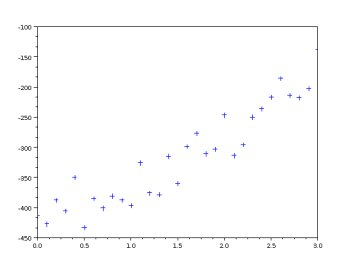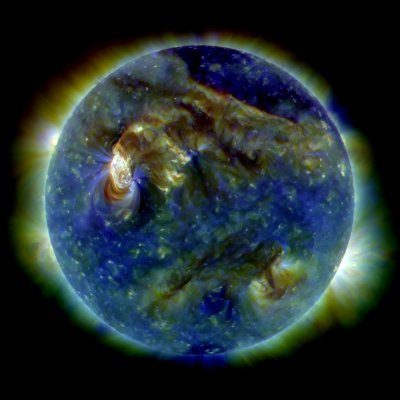Updated: July 22, 2011; February 13, 2015
Global warming could refer to a possible and not yet quite unequivocally proven phenomenon of a gradual increase in Earth's surface and atmospheric temperatures due to natural, environmental changes as well as human impact. However, global warming is first and foremost a human-made buzz word created around twenty years ago, intended to give us a deep, proverbial jolt in our conscience gland and make us rethink the destructive industrialization schemes and policies of the modern world.
As such, I felt it was necessary that I step in and vomit my share of wisdom onto the world. I'm not really concerned whether the world is heating up, boiling or just about to explode. I couldn't care less. I'm here for a handful more decades, after that, who cares what happens. The planet's been around for five billion years, it will survive several more. What I want to share with you is my super-scientific, neutral approach to yet another concept that deserves no other praise but a testicular one. In our bollocks series, we already did prophecies, ghosts and vampires. Time for another debunking. So follow me, let's fly on a barbecue trajectory.

Blame the cows
Lots of carbon-dioxide in the air is not a good thing, they tell us. Carbon-dioxide is important as the breathing catalyst, but too much of it can cause trouble, the most famous being the greenhouse effect. In large concentrations, carbon-dioxide could inhibit the normal absorption and emission of heat radiation in the atmosphere, leading to an increase in temperature and radical change in climate. And there's methane, too.
Global warming fans point out the fact that carbon-dioxide and methane levels have risen 30% and 150% since the beginning of the industrial revolution, respectively. Interesting. I mean, it is interesting that greenhouse gas emissions were sampled as far back as 1833, which seems a bit far fetched. Mathematical extrapolations are a blast.
One of the chief culprits seems to be the domestic cow. It is said to be the main source of greenhouse gases in the past century or so. Bad, bad cow. We should eat more of them, to reduce the effect. Only, cows are blamed for no good reason. Not only are they not the chief archenemy of our atmosphere, they are far from being a significant one in any way.

Believe it or not, in the animal kingdom, the main producer of greenhouse gases are termites. They produce as much as 26 times more carbon-dioxide than cows. Yes, those little insects that chew on dead plants. How naughty of them. But don't wish them dead just yet, because they keep pretty much the entire tropical and subtropical region alive. So, cows are pretty much blameless. And they taste so much better than insects.

Blame the rain forests
This is another hot topic. The claim goes as follows: the massive deforestation of jungles and rain forests causes a major drop in oxygen levels in the atmosphere, or rather, an increase in carbon-dioxide levels, which, again, leads to the infamous greenhouse effects and further heating of the planet.
Not true, I'm afraid. 99% of all oxygen created in the process of photosynthesis is by phytoplankton. Yes, that's right. The seemingly unnecessary and boring biomass is what makes our atmosphere habitable, and has been doing so for the last couple of billions of years. If there's anything we should be worried about not messing up, it's the plankton, really. Keep the ocean flora balanced like.

Note: This image was taken from Wikipedia, licensed under CC BY-SA 3.0.
Forests are important for many other reasons, like soil erosion, see what happened in Madagascar, local weather barriers, being a natural habitat for many species, and whatnot, but it's not the oxygen that we should we worried about. Far from it.
Blame the science
Now you're talking. Finally, here's something that really needs a closer inspection. If there's one thing in this world that humans can really exert their influence over is their own work. They can sit in their labs and do all kinds of wicked research, but more importantly, they can decide what their research will look like. Changing the climate is not an easy thing. Assessing millennium-long trends on concentrations of elements in the atmosphere and the subtle changes in ocean currents can be daunting. There's an easier way.
How a typical scientific experiment / PhD thesis is done
I'm not trying to disparage the research efforts by hundreds of thousands of students around the world, I'm just trying to portray the real picture of how experiments are done in the academy. Been there, done that. So, here's the template.
You decide on a subject, but more importantly you decide on what you want to prove. The reasons are simple. Unlike industry, where you can afford to run a project or publish a paper that shows negative results, you don't have this luxury in the academy. Your research must succeed, otherwise, it's worthless. Therefore, you must decide on the success criteria before you even begin.
Two years into the project, you're nearing the deadline for your submission, you're broke as you live off a meager scholarship, you're tired, you're out of time, you want to graduate and be done with it. Halfway through your thesis work, you discovered a whole bunch of new evidence that contradicts your initial guess, but it's too late to stop now. You're like a bullet train, straight as an arrow, fast and unstoppable. You can't be distracted by wrong numbers, so to speak.

Therefore, you apply the force of statistics to muddle the results. You dismiss tons of data as outliers or bad experiment, you blame the equipment or the experiment conditions, you focus on numbers that will prove you what you wanted to prove. It's a self-sustaining cycle and it's unbeatable. Your work is eventually published.
Worse yet, sometimes grants are given by companies and bodies that have a serious, vested interest in seeing your research succeed. This turns the supposedly neutral, unbiased lab work and test into a one-sided marketing campaign, bolstered by frightening numbers. I mean, how many people are going to argue with you if you tell them you have run Anova 3D against the circumcized plot distribution in Matlab?

Skewing the numbers
This seems to be the main reason why theories can be proven one moment, refuted the next. There's a battle between the pro- and anti- global warming camps, each trying to champion their cause. Some will claim this, some will claim that. One thing is sure though, with human ego taking precedence over everything else, you can't really trust the numbers. Or rather, you can't trust them after they have been mangled, molested, rounded, truncated, shifted, offset, abused, and changed.
I've even read all sorts of online articles and snippets of mails where people are asking their peers for help on how to present the data so they can show that global warming is indeed happening or not happening. Sad really, when you think about it. But it definitely makes the whole idea pointless.
Human perception of things
We like to think we mean something on the global scale, the truth is, we are meaningless. Only 40,000 years ago, the Ice age ended, without any human intervention. A colossal climate change shook the world, with ice caps receding thousands of kilometers. We did not have cows back then, nor nuclear reactors, nor coal plants. The world went by just fine without any interference by us. Middle ages were colder than they ought to have been, so they tell us. So you win some, you lose some.
Now, throw in sun flares, magnetic pole reversals, other fancy cosmic activities, none of which we understand well, and you can pretty much show and prove anything you want, as long as you keep extrapolating. It's just that our subset of data is so tiny and unreliable. Our fifty or sixty years of accurate measurement of environmental factors is a speck on the timescale of Earth's history. There's no way we can predict anything with any reasonable accuracy. Even one whole century on a scale of 40,000 years is just 0.25%. It's almost a joke.

Conclusion
Earth may or may not be heating up. It's irrelevant. Just a speck of uneventful fluctuations in the life of a planet. We could be somehow contributing to the standard error, but we sure don't know how we're doing it or how much. We're merely guessing what feels like a convenient train of thought, and we're using the scientific agenda to promote political and industrial goals.
The sheer illusion of human self-importance is hilarious. The fact we have been using toilet bowls for a while and can use smartphones to order pizza, possibly while in the toilet, does not make us any smarter when it comes to understanding the hugely complex ecosystems like an entire bloody planet, influenced by another half a million cosmic events every now and then.
Global warming is a buzzword. Nothing more. It has nothing to do with actual, factual changes in the climate. If anything, the fact we're trying to manipulate data to desperately prove something could in fact cause even greater damage than we imagine. Forget it, just enjoy life. And if a big meteor goes kaboom one day, make sure you are well rested for the spectacle.
Cheers.